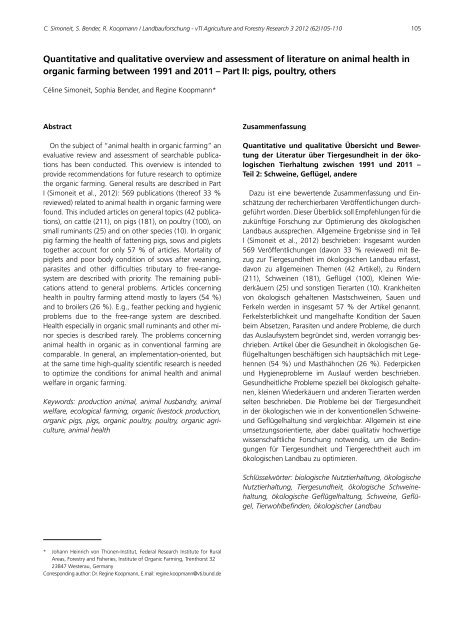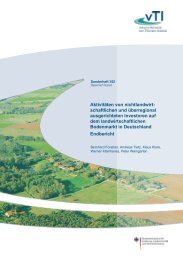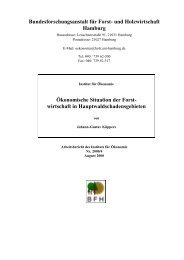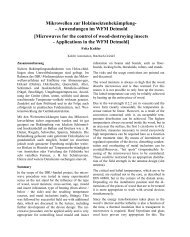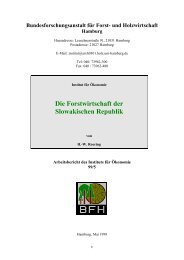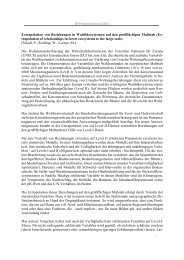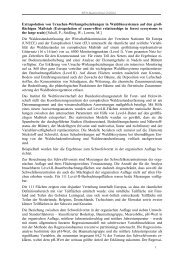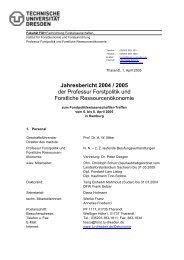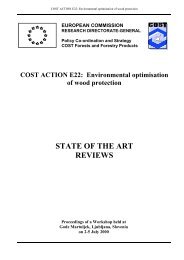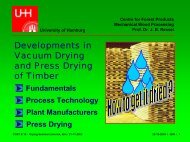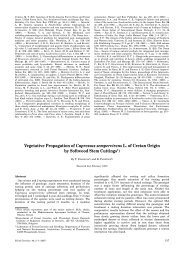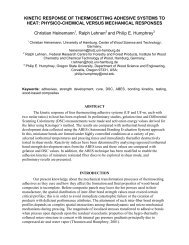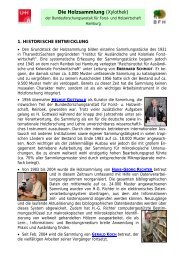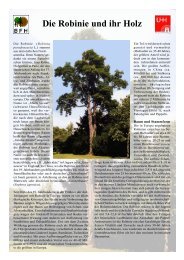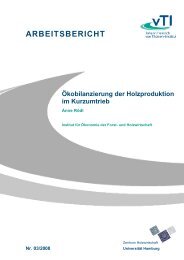Landbauforschung vTI Agriculture and Forestry ... - 1. Januar 2008
Landbauforschung vTI Agriculture and Forestry ... - 1. Januar 2008
Landbauforschung vTI Agriculture and Forestry ... - 1. Januar 2008
Create successful ePaper yourself
Turn your PDF publications into a flip-book with our unique Google optimized e-Paper software.
C. Simoneit, S. Bender, R. Koopmann / <strong>L<strong>and</strong>bauforschung</strong> - <strong>vTI</strong> <strong>Agriculture</strong> <strong>and</strong> <strong>Forestry</strong> Research 3 2012 (62)105-110 105<br />
Quantitative <strong>and</strong> qualitative overview <strong>and</strong> assessment of literature on animal health in<br />
organic farming between 1991 <strong>and</strong> 2011 – Part II: pigs, poultry, others<br />
Céline Simoneit, Sophia Bender, <strong>and</strong> Regine Koopmann*<br />
Abstract<br />
On the subject of “animal health in organic farming” an<br />
evaluative review <strong>and</strong> assessment of searchable publications<br />
has been conducted. This overview is intended to<br />
provide recommendations for future research to optimize<br />
the organic farming. General results are described in Part<br />
I (Simoneit et al., 2012): 569 publications (thereof 33 %<br />
reviewed) related to animal health in organic farming were<br />
found. This included articles on general topics (42 publications),<br />
on cattle (211), on pigs (181), on poultry (100), on<br />
small ruminants (25) <strong>and</strong> on other species (10). In organic<br />
pig farming the health of fattening pigs, sows <strong>and</strong> piglets<br />
together account for only 57 % of articles. Mortality of<br />
piglets <strong>and</strong> poor body condition of sows after weaning,<br />
parasites <strong>and</strong> other difficulties tributary to free-rangesystem<br />
are described with priority. The remaining publications<br />
attend to general problems. Articles concerning<br />
health in poultry farming attend mostly to layers (54 %)<br />
<strong>and</strong> to broilers (26 %). E.g., feather pecking <strong>and</strong> hygienic<br />
problems due to the free-range system are described.<br />
Health especially in organic small ruminants <strong>and</strong> other minor<br />
species is described rarely. The problems concerning<br />
animal health in organic as in conventional farming are<br />
comparable. In general, an implementation-oriented, but<br />
at the same time high-quality scientific research is needed<br />
to optimize the conditions for animal health <strong>and</strong> animal<br />
welfare in organic farming.<br />
Keywords: production animal, animal husb<strong>and</strong>ry, animal<br />
welfare, ecological farming, organic livestock production,<br />
organic pigs, pigs, organic poultry, poultry, organic agriculture,<br />
animal health<br />
* Johann Heinrich von Thünen-Institut, Federal Research Institute for Rural<br />
Areas, <strong>Forestry</strong> <strong>and</strong> Fisheries, Institute of Organic Farming, Trenthorst 32<br />
23847 Westerau, Germany<br />
Corresponding author: Dr. Regine Koopmann, E.mail: regine.koopmann@vti.bund.de<br />
Zusammenfassung<br />
Quantitative und qualitative Übersicht und Bewertung<br />
der Literatur über Tiergesundheit in der ökologischen<br />
Tierhaltung zwischen 1991 und 2011 –<br />
Teil 2: Schweine, Geflügel, <strong>and</strong>ere<br />
Dazu ist eine bewertende Zusammenfassung und Einschätzung<br />
der recherchierbaren Veröffentlichungen durchgeführt<br />
worden. Dieser Überblick soll Empfehlungen für die<br />
zukünftige Forschung zur Optimierung des ökologischen<br />
L<strong>and</strong>baus aussprechen. Allgemeine Ergebnisse sind in Teil<br />
I (Simoneit et al., 2012) beschrieben: Insgesamt wurden<br />
569 Veröffentlichungen (davon 33 % reviewed) mit Bezug<br />
zur Tiergesundheit im ökologischen L<strong>and</strong>bau erfasst,<br />
davon zu allgemeinen Themen (42 Artikel), zu Rindern<br />
(211), Schweinen (181), Geflügel (100), Kleinen Wiederkäuern<br />
(25) und sonstigen Tierarten (10). Krankheiten<br />
von ökologisch gehaltenen Mastschweinen, Sauen und<br />
Ferkeln werden in insgesamt 57 % der Artikel genannt.<br />
Ferkelsterblichkeit und mangelhafte Kondition der Sauen<br />
beim Absetzen, Parasiten und <strong>and</strong>ere Probleme, die durch<br />
das Auslaufsystem begründet sind, werden vorrangig beschrieben.<br />
Artikel über die Gesundheit in ökologischen Geflügelhaltungen<br />
beschäftigen sich hauptsächlich mit Legehennen<br />
(54 %) und Masthähnchen (26 %). Federpicken<br />
und Hygieneprobleme im Auslauf werden beschrieben.<br />
Gesundheitliche Probleme speziell bei ökologisch gehaltenen,<br />
kleinen Wiederkäuern und <strong>and</strong>eren Tierarten werden<br />
selten beschrieben. Die Probleme bei der Tiergesundheit<br />
in der ökologischen wie in der konventionellen Schweine-<br />
und Geflügelhaltung sind vergleichbar. Allgemein ist eine<br />
umsetzungsorientierte, aber dabei qualitativ hochwertige<br />
wissenschaftliche Forschung notwendig, um die Bedingungen<br />
für Tiergesundheit und Tiergerechtheit auch im<br />
ökologischen L<strong>and</strong>bau zu optimieren.<br />
Schlüsselwörter: biologische Nutztierhaltung, ökologische<br />
Nutztierhaltung, Tiergesundheit, ökologische Schweinehaltung,<br />
ökologische Geflügelhaltung, Schweine, Geflügel,<br />
Tierwohlbefinden, ökologischer L<strong>and</strong>bau


